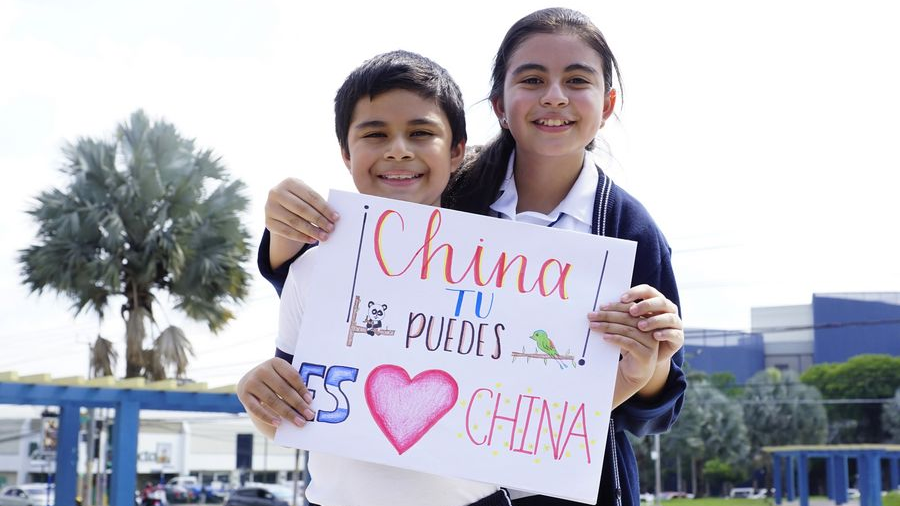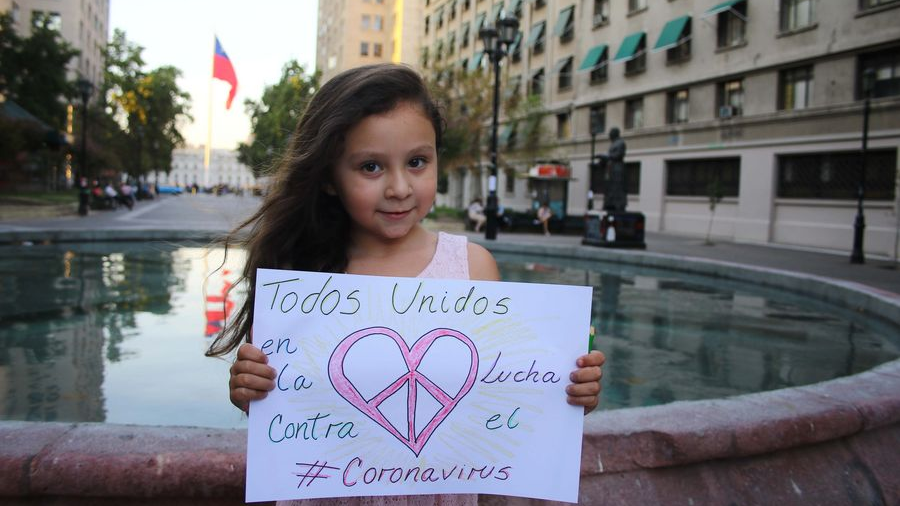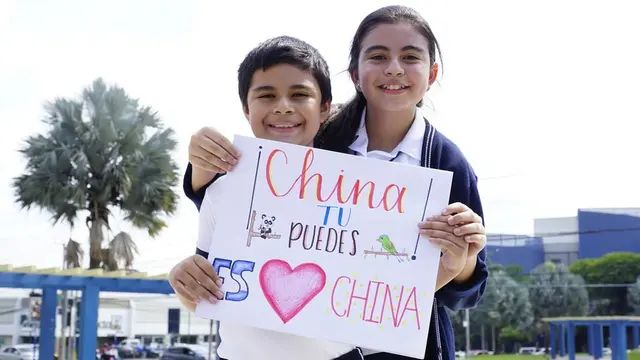
Valeria Castellano, 13, with her 11-year-old brother Javier Castellano, shows a painting with words of encouragement to China in San Salvador, El Salvador, February 7, 2020. /Xinhua
Editor's note: Hamzah Rifaat Hussain is a former visiting fellow at the Stimson Center in Washington and serves as assistant researcher at the Islamabad Policy Research Institute in Pakistan. The article reflects the author's opinions and not necessarily the views of CGTN.
As vaccine inequity becomes more pronounced across the globe, the U.S. State Department issued a statement on May 14 underlining U.S. support for Honduras while condemning what it terms the "cyclical use" of COVID-19 vaccines for political purposes in the region from China. The lead taken by Washington D.C. came from Taipei's earlier accusation that the Chinese mainland was leveraging vaccines to secure diplomatic inroads into its own allies in Latin America. This latest criticism of China is both frail and an affront to genuine Chinese vaccine efforts in the region and across the globe.
Firstly, bilateral diplomacy between two or more sovereign states cannot be dictated by a third entity such as Taiwan. Honduras has chosen the Chinese route for vaccinations given that last week Honduran President Juan Orlando Hernandez mulled over the option of opening a trade office in China, which acts as a testament to Beijing's unconditional and apolitical vaccination efforts across the region.
Many states in the region and beyond have considered China as a viable option, a fact acknowledged by think tanks in the U.S. such as the Wilson Center with Professor Cynthia Sanborn of Peru's Universidad del Pacifico terming Beijing's efforts as "timely, strategic and significant." For Taiwan to simply jump in and make a mockery of state-sponsored global vaccination efforts is condemnable.
It is also noteworthy that Chinese mainland global vaccination efforts have vastly outstripped the U.S., which may explain why Washington and Taipei have suddenly decided to launch tirades against Beijing. Perhaps a better strategy would be to introspect instead of assign blame, given that the American response globally, let alone Latin America, has been limited to waiving patents and exporting fewer shots as developing nations suffered from impending humanitarian disasters.
On the other hand, countries in South America such as Peru have acknowledged Beijing's unconditional support such as the provision of medical supply donations, swift sale of masks and ventilators along packages such as $1 billion donations for vaccines in the country. The Taiwanese authorities should accept this reality that genuine efforts at mitigating the pernicious effects of COVID-19 on Latin American shores have been lauded by sovereign states without an ounce of politicization. For the U.S. State Department to term such efforts as "narrow political agendas of certain donors" also lacks credibility.
There is no evidence to suggest that China, both historically and temporarily, is interested in advancing political objectives or influencing the political systems of countries as diverse as Chile and Venezuela, given that non-interference and respect for state sovereignty are pillars of Chinese foreign policy.

Danna Suarez, a 5-year-old girl, shows her drawing to cheer for China in fighting the novel coronavirus in Santiago, Chile, February 10, 2020. /Xinhua
The dynamic and diverse political systems of the continent have had to historically bear the consequences of intervention from the U.S., which has complicated matters in certain states. China has only continued its policy of providing unconditional support to the continent in the form of vaccine exports and donations.
Ironically it is Taiwan itself that is actually politicizing Latin American globalization efforts. Recall that in March last month, Taiwanese official Joseph Wu said that Taiwan will help its handful of remaining "diplomatic allies" towards purchasing COVID-19 vaccines with the precondition that Taiwanese funds will not be used to obtain Chinese mainland vaccines.
This "us vs. them" mentality is being perpetuated by Taipei, which, in the words of China's Foreign Ministry Spokesperson Hua Chunying are attempts at political manipulation, smearing and rumor-mongering with no evidence suggesting that vaccine supplies on the part of the Chinese mainland are being made conditional upon countries such as Paraguay towards breaking ties with Taiwan.
Through such brazen politicization, the Taiwanese authorities continue to weaken its own position without any credibility towards censuring the Chinese mainland's apolitical inoculation efforts and contrary to its claims, there is no linkage between democracy being threatened in South America by Chinese vaccine or vice versa.
Hence, a realization must exist that such efforts at belittling China will always be futile. For the U.S., standing with countries such as Honduras entails standing with Tegucigalpa and other capitals across the region for their just right to unfettered access to vaccines based on humanitarian concerns.
The U.S. has so far not delivered on that front, with Juan Orlando Hernandez of Honduras claiming that Western hoarding of vaccines is both frustrating and prompting his government to tap into China. Definitely not an excuse for either Taiwan or the United States to demonize the Chinese mainland on the vaccination front in the region and beyond.
(If you want to contribute and have specific expertise, please contact us at [email protected].)
 简体中文
简体中文

